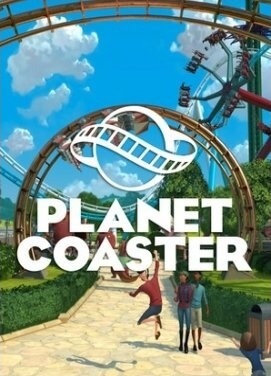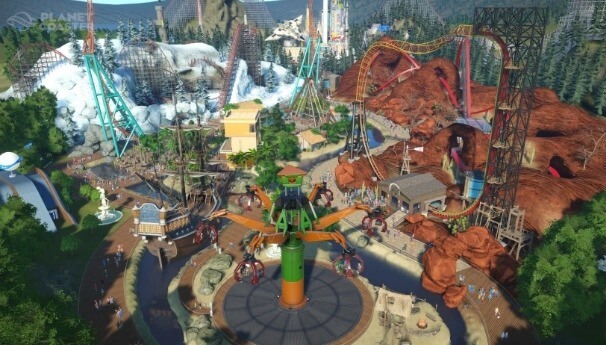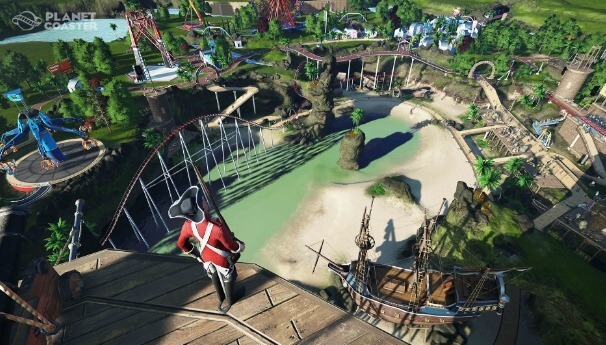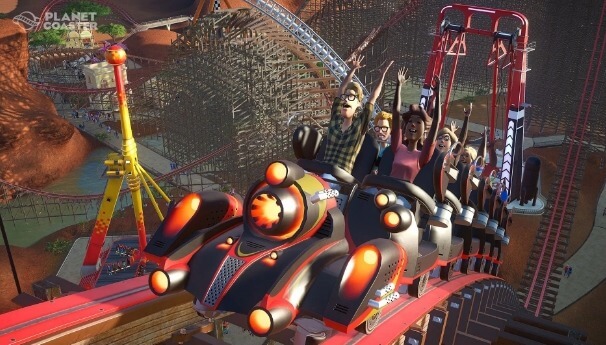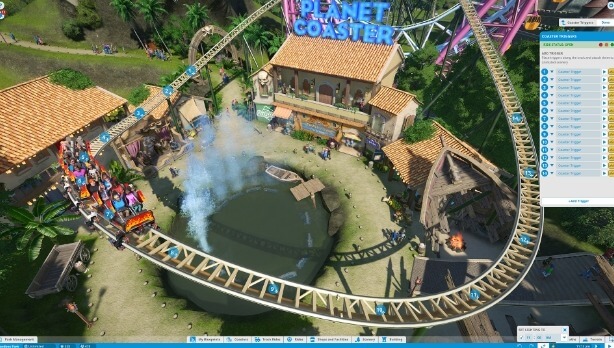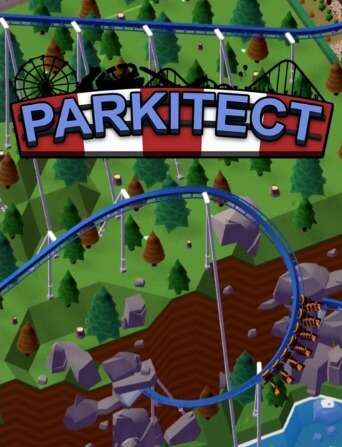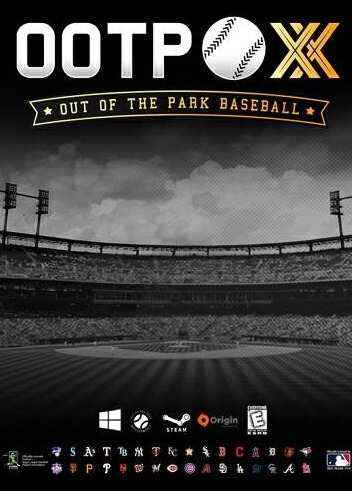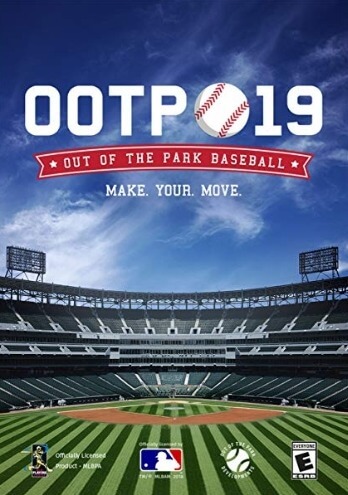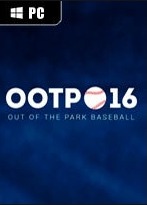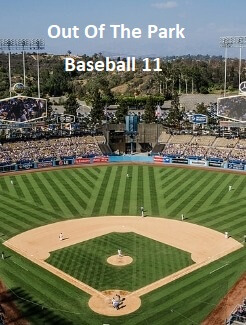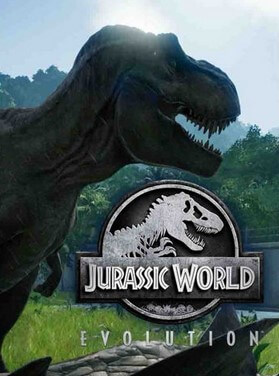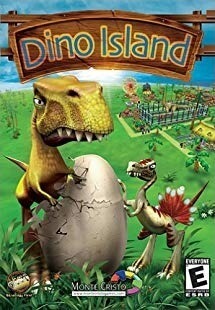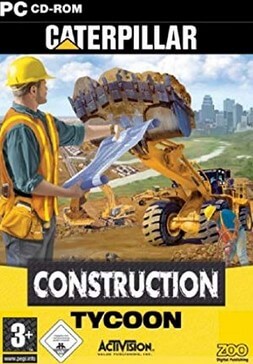Similar to Frontier's previous game, RollerCoaster Tycoon 3, the Sandbox Mode enables players to construct their own theme park on an empty plot of land. In Sandbox Mode, all features and rides of the game are unlocked and your funds are unlimited. This is the mode most players use to create items (parks, coasters, scenery, etc.) and then post them to Steam's Planet Coaster Workshop.
In the Challenge Mode, the player must construct an amusement park on an empty lot (similar to Sandbox Mode) but with limited funds and research depending on chosen difficulty—Easy, Medium, or Hard. As the player develops their park, the game presents the player with challenges that the player must accept or decline. Upon completion of a challenge, the player is given a reward such as a park rating boost or a sum of money.
In the Career Mode, the player must complete objectives such as constructing roller coasters, achieving park ratings or hiring janitors. Similar to RollerCoaster Tycoon 3, Career Mode allows players to progress by completing scenarios with objectives in different difficulties.
First unveiled at EGX 2016, the game also features a dedicated mode called the "crash mode" which allows players to construct incomplete coasters and let them crash into the park's visitors.
On 26 April 2017, Frontier revealed the existence of several cheat codes that were previously undiscovered on their official forums. These included the ability to ride go-karts and the ability for security guards to plough through guests similarly to a bulldozer.
Development
Before the development of Planet Coaster, Frontier Developments had developed several other construction and management simulation video games, including 2004's commercial and critical success RollerCoaster Tycoon 3, which sold over 10 million copies. Planet Coaster serves only as a spiritual successor to RollerCoaster Tycoon 3 instead of a direct sequel, as the company considered the use of the brand Tycoon "didn’t carry the cachet anymore" due to the releases of mainly poorly-received Tycoon games in recent years. In a December 2016 interview with Cambridge News, David Walsh (the Chief Operating Officer of Frontier Developments) said that the success of Elite: Dangerous enabled the company "to bring Planet Coaster to the market, which is highly significant as it demonstrates we are not a single game company”. Frontier Developments spent £6 million on the game's development and an additional £1.5 million on marketing.
The game was announced on 29 January 2015 by Frontier Developments. Originally called Coaster Park Tycoon, the game was renamed into Planet Coaster on 16 June 2015 during the PC Gaming Show at E3 2015. Frontier Developments aimed to turn the game into the company's second self-published franchise, along with the Elite series. The game uses an advanced version of Cobra Engine, which is an in-house proprietary engine developed by Frontier previously used by games like Elite Dangerous and RollerCoaster Tycoon 3. Features confirmed for the game include a hybrid spline/piece-by-piece coaster builder, modular structure building, a voxel terrain editor among others detailed through Q&A's and "Dev Diaries." On the second live stream, the release date of the alpha was announced. Released on 22 March 2016, the alpha emphasized on modular building and paths. The alpha contained two themes: "Planet Coaster" and "Pirate". Although disabled by default, Coaster Building was included in the first alpha through a cheat code.
Reception
Pre-release
The game was met with praise upon release of the alpha. Andy Kelly of PC Gamer commented that Frontier was "off to a tremendous start", adding that creating buildings with the creation tools hinted at "immense possibilities". However, Mark Walton of Ars Technica noted several small flaws including the "hard to navigate" menus and the lack of custom built roller coasters. On 27 April 2016, about a month after the release of the alpha, Frontier announced that Planet Coaster had grossed nearly two million dollars.
Release
Matt Wales of Eurogamer recommended the game, concluding that the game is "the finest simulator yet". Meanwhile, Ben Reeves of Game Informer praised the game for its creative mode but criticized the game's career mode, referring it to as "boring" and "tedious". TJ Hafer of IGN compared the game's integration of Steam Workshop to Minecraft and Second Life. Edmond Tran of GameSpot praised the game for its accessible creative tools and for its evocative tone. Jonathan Leack of Game Revolution claimed that the game "resurrected the theme park simulation genre". In a critical review of the game, Jody Macgregor of PC Gamer praised the game's challenge mode but criticized the game for not innovating enough from RollerCoaster Tycoon 3. The original score (70/100) was retracted due to miscommunication between Frontier Developments and PC Gamer with the game version they received; its reevaluated score is 75/100. Patrick Hancock of Destructoid noted that the game suffers frame rate issues in larger parks. Furthermore, Edge noted that the game's "fiddly" camera makes some actions harder.
Sales
Upon release, the game topped the Steam "top sellers" charts. The game sold over 400,000 copies in the first month of its release. Despite being released in the later part of the year, Planet Coaster was featured on Steam's "Top 100 Best Sellers of 2016" chart as a "silver tier" title. In August 2017, the game sold its one millionth copy. In July 2018, a leak in Valve's API revealed that over 1.68 million Steam users owned Planet Coaster. 2 million copies of the games were sold by January 2019.
